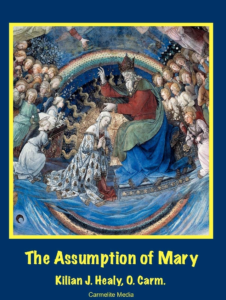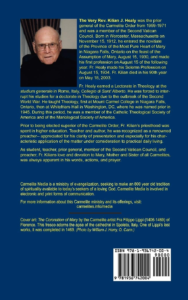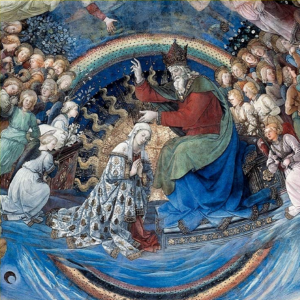The Assumption of Mary: Heavenly Glory 2024
The Assumption of Mary is a central belief in Catholic theology, celebrated with reverence and devotion by millions around the world. In his profound work, The Assumption of Mary, Kilian John Healy delves deep into this essential doctrine, providing readers with a thorough understanding of its significance within the Christian faith. This book is not just a theological exploration but also a reflection on the spiritual and moral lessons that can be drawn from Mary’s Assumption.
Kilian John Healy, a respected theologian and scholar, brings his extensive knowledge and deep faith to this work, making it an invaluable resource for anyone interested in understanding the Assumption of Mary in its full context. The book is divided into two main parts: The Assumption in the Mystery of Christ and The Assumption in the Mystery of the Church, each offering unique insights into this sacred event.
The Assumption in the Mystery of Christ
The first part of Healy’s book, The Assumption in the Mystery of Christ, explores the profound connection between the Assumption of Mary and the life, death, and resurrection of Jesus Christ. It explores how Mary’s role in the redemptive work of Christ is intimately connected to her ultimate destiny. Healy argues that Mary’s Assumption is not merely an isolated event but a culmination of her unique relationship with God.
- Mary as the New Eve: Healy emphasizes the biblical typology of Mary as the New Eve, contrasting her with the original Eve. Just as Eve’s disobedience led to humanity’s fall, Mary’s obedience brought about redemption. Her Assumption, therefore, is seen as the ultimate victory over sin and death, a triumph echoed in Christ’s resurrection.

- Mary as the Immaculate Conception: The doctrine of the Immaculate Conception, which states that Mary was conceived without original sin, is essential to understanding her Assumption. It is through her sinless nature that she becomes the worthy vessel for the Incarnation and, subsequently, the first to experience the fullness of divine life.
Mary’s Assumption is understood as the moment when she was taken up into Heaven, body and soul, at the end of her earthly life. This event is seen as a direct consequence of her unique role as the Mother of God and her close association with the life of Christ. Just as Christ was resurrected and ascended into Heaven, Mary too was assumed into Heaven, reflecting the promise of eternal life for all believers.
Healy emphasizes the theological significance of the Assumption, particularly its connection to the resurrection of Christ. Mary’s Assumption is a testament to the victory over sin and death that Christ achieved through his resurrection. It serves as a reminder to the faithful of the hope of resurrection and eternal life promised to all who follow Christ.
The Assumption in the Mystery of the Church
In the second part, The Assumption in the Mystery of the Church, Healy explores Mary’s role within the Church and how her Assumption is a reflection of the Church’s faith and teachings. Mary, as the Mother of the Church, holds a special place in the heart of Catholicism, and her Assumption is a symbol of the Church’s belief in the ultimate triumph of good over evil. He explores how Mary’s Assumption serves as a model and a promise for the Church.
- Mary as the Model of the Church: Healy argues that Mary’s Assumption is a prophetic sign of the Church’s ultimate destiny. Just as she was taken body and soul into heaven, so too will the Church be glorified at the end of time. This vision of the Church’s eschatological hope is a powerful and inspiring message.
- Mary as Queen of Heaven: The title “Queen of Heaven” is often associated with Mary. Healy delves into the meaning of this title, suggesting that it signifies her role as mediatrix and intercessor for the Church. Her queenship is not a worldly dominion but a spiritual authority based on her unique relationship with God.
Mary’s Assumption is also a source of comfort and hope for the faithful. It reminds them that, just as Mary was taken up into Heaven, they too can hope for eternal life with God. The Assumption is a celebration of this hope and a reminder of the Church’s mission to lead all people to salvation.
What is the Assumption of Mary?
The Assumption of Mary is a belief that Mary, unique among humanity, was preserved from the corruption of the tomb and directly assumed into the glory of heaven. This doctrine, while central to Catholic faith, has also sparked curiosity and questions among people of other faiths and those seeking a deeper understanding of Christian theology.
The Assumption of Mary is a matter of faith for Catholics. While it’s not a doctrine that can be proven scientifically or historically, it is accepted as a revealed truth based on divine revelation and the teachings of the Church.
The Assumption is not explicitly mentioned in the Bible but is based on Church tradition and the teachings of the early Church Fathers. It is considered one of the four Marian dogmas of the Catholic Church, along with the Immaculate Conception, Mary’s perpetual virginity, and her title as Mother of God.
Why is the Assumption Celebrated on August 15th?
The feast of the Assumption is celebrated on August 15th every year, a tradition that dates back to the early centuries of the Church. The date was chosen because it is believed to be the day when Mary was assumed into Heaven.
August 15th is a public holiday in many Catholic countries, and the feast is marked by special Masses, processions, and other religious observances. The Assumption is one of the most important Marian feasts and is a day of great celebration and joy for Catholics worldwide.
What Does the Bible Say About Mary’s Assumption?
The Bible does not explicitly mention the Assumption of Mary, which has led to various interpretations and debates among theologians. However, the belief in the Assumption is supported by passages that speak of Mary’s special role in the life of Jesus and her unique place in God’s plan of salvation.
The early Church Fathers wrote extensively about Mary’s Assumption, and their teachings have been passed down through the centuries as part of Church tradition. The belief in the Assumption was formally defined as a dogma by Pope Pius XII in 1950.
While the Bible doesn’t explicitly mention the Assumption, Healy and other theologians find support for the doctrine in various biblical passages. These include:
- Promises of eternal life: Scriptures offer promises of eternal life for believers, suggesting the possibility of bodily resurrection.
- Mary’s unique role: The New Testament emphasizes Mary’s special place in God’s plan, hinting at a unique destiny.
- Theological reflection: Through careful biblical interpretation and theological reasoning, the doctrine of the Assumption is developed.
Lessons of the Assumption of Mary
The Assumption of Mary offers profound spiritual lessons for believers:
- Hope in the face of death: Mary’s Assumption provides hope and consolation in the face of death, assuring believers of the possibility of eternal life. Mary’s Assumption is a sign of the resurrection that awaits all believers and a promise that death is not the end but the beginning of a new and eternal life with God.
- The importance of faith: Mary’s unwavering faith in God is a model for all Christians. The Assumption teaches the importance of faithfulness and obedience. Mary’s life was marked by her unwavering faith in God and her willingness to say “yes” to His will. Her Assumption is a reward for her faithfulness and an encouragement for all Christians to remain faithful in their own lives.
- The power of God’s grace: Mary’s Assumption is a testament to the transformative power of God’s grace.
How to Celebrate the Assumption of Mary?
Celebrating the Assumption of Mary can be a deeply spiritual and joyful experience. Traditional ways to celebrate include attending Mass, praying the Rosary, and participating in processions or other community celebrations. The day is celebrated with various traditions and devotions:
- Attending Mass: Participating in a special Assumption Mass is a central way to celebrate.
- Marian devotions: Reciting the Rosary, praying the Angelus, or visiting Marian shrines are popular practices.
- Acts of charity: Many people choose to perform acts of kindness and charity in honor of Mary.
- Family gatherings: Spending time with loved ones and sharing in the joy of the feast is a cherished tradition.
In addition to these traditional practices, you might also consider personal ways to celebrate, such as spending time in prayer and reflection, reading about Mary’s life and role in the Church, or performing acts of charity in her honor.
Who Crowned Mary, Queen of Heaven?
Mary is often referred to as the Queen of Heaven, a title that reflects her exalted place in the Church. The tradition of crowning Mary as Queen of Heaven is a beautiful expression of devotion. While there’s no historical record of a literal coronation, the title is a symbolic recognition of her exalted position. It is believed that God himself, through the work of Christ, has crowned Mary as Queen.
The title of Queen of Heaven is closely connected to the Assumption, as it symbolizes Mary’s glorification and her role as the Mother of the King of Heaven and Earth. The image of Mary as Queen is a powerful reminder of her intercessory role and her closeness to God.
Is the Assumption of Mary True?
The truth of the Assumption of Mary is a matter of faith for Catholics. While it is not explicitly mentioned in the Bible, the Assumption is supported by centuries of Church tradition and the teachings of the early Church Fathers.
The Assumption was declared a dogma of the Catholic Church by Pope Pius XII in 1950, meaning that it is a belief that all Catholics are required to accept. For many, the Assumption is a sign of God’s power and love, and a promise of the resurrection that awaits all who follow Christ.

What Mystery is the Assumption of Mary?
The Assumption of Mary is considered one of the Glorious Mysteries of the Rosary, a set of prayers that reflect on key events in the life of Jesus and Mary. The Glorious Mysteries are prayed on Wednesdays and Sundays and include the Resurrection, the Ascension, the Descent of the Holy Spirit, the Assumption, and the Coronation of Mary as Queen of Heaven.
The Assumption of Mary is a profound mystery, transcending human understanding. It reveals the depths of God’s love and power, as well as the ultimate destiny of humanity. It is a mystery that invites contemplation and inspires awe. Praying the Rosary and meditating on the mysteries of the Assumption can be a powerful way to deepen one’s faith and grow closer to Mary and Jesus.
Conclusion
The Assumption of Mary is a profound and meaningful doctrine that offers hope, comfort, and inspiration to Christians around the world. It offers a glimpse into the meaning of life and the reality of death. It suggests that life has a purpose beyond this world and that death is not the end and a reminder that death is not something to be feared but a passage to a new and glorious life with God.
As we reflect on Mary’s Assumption, we are reminded of the hope of resurrection, the importance of faithfulness, and the promise of eternal life with God. The Assumption is a celebration of these truths and a call to live our lives in faith, hope, and love.
FAQs
- What is the Assumption of Mary?
The Assumption of Mary is the belief that Mary, the Mother of Jesus, was taken up into Heaven, body and soul, at the end of her earthly life. - Why is the Assumption of Mary important?
The Assumption is important because it reflects the hope of resurrection and eternal life for all believers and underscores Mary’s unique role in the salvation story. - How is the Assumption different from the Ascension of Jesus?
The Ascension of Jesus refers to Jesus rising to Heaven by his own power, while the Assumption of Mary refers to Mary being taken up into Heaven by God’s power. - Can non-Catholics celebrate the Assumption?
While the Assumption is a Catholic doctrine, non-Catholics can appreciate the spiritual significance of Mary’s role and participate in the celebrations if they choose. - What is the significance of the Rosary in the Assumption?
The Assumption is one of the Glorious Mysteries of the Rosary, and praying the Rosary can help believers reflect on Mary’s Assumption and its significance in their spiritual lives.


